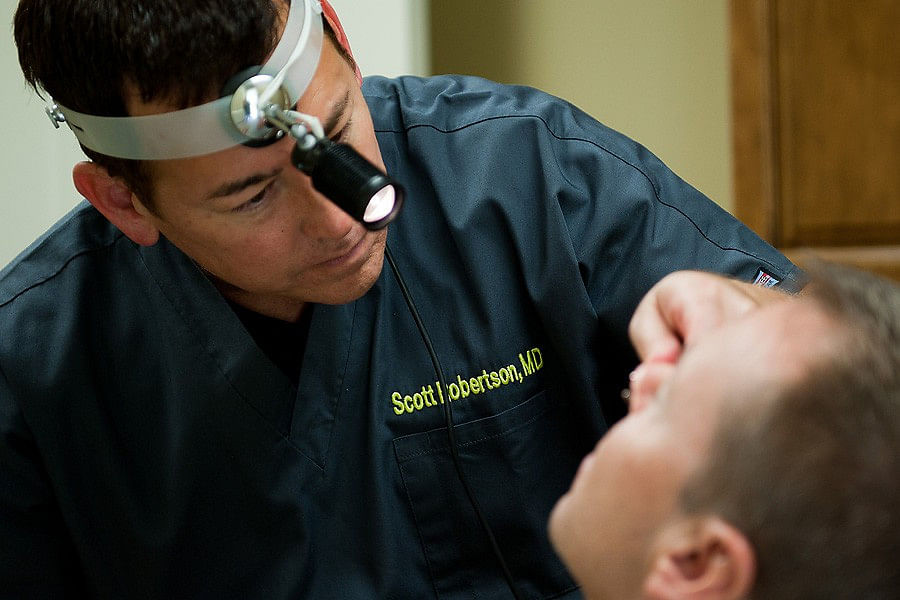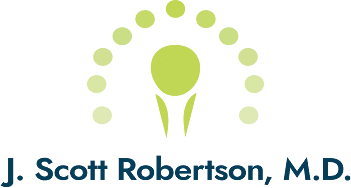“Caring for you like family .”
Birmingham Sinusitis Treatment
What is Sinusitis?
Sinusitis is a pervasive condition affecting a vast number of individuals worldwide. It stems from inflammation or swelling of the sinus lining, resulting in symptoms such as nasal congestion, facial pain, thick discolored discharge, and even recurrent headaches. However, it’s important to understand that not all cases of sinusitis are caused by bacteria or viruses. Recognizing sinusitis and understanding its root causes can facilitate effective management. When it comes to comprehensive sinusitis ENT services, Dr. Scott Robertson’s clinic offers expert care tailored to your specific needs, ensuring that you receive the best possible treatment outcomes.


How severe is your sinusitis?
What Causes Chronic Sinusitis?
Most patients who suffer from an acute case of sinusitis respond well to medical treatment and return to their everyday activities within one to two weeks. When sinusitis persists over months, or when recurring episodes occur frequently, Dr. Robertson and Dr. Marshall will work towards pinpointing the nature of your specific problem. At times, underlying medical problems or conditions can contribute to the chronic nature of sinusitis.
Allergens like pollens, dust mites, mold spores, and pet dander can instigate sinusitis. The Southeastern United States in particular is filled with pollens and other irritants. Inhalation of these irritants triggers inflammation in the nasal passages. Secondary environmental allergies include dust mites, ragweed, family pets, pollution, and more. These patients are at an increased risk of sinusitis as a result. As the nasal tissues swell, they produce excess mucus leading to congestion, blockage, and eventual infection. Regular exposure to allergens can lead to repeated bouts of sinusitis, making it a chronic condition. Allergy testing in the form of epicutaneous (prick) and intradermal skin testing at our nearby ENT clinic readily identifies possible allergens.
People with weakened immune systems, either due to underlying health conditions or certain medications, face higher risks of infections, including sinusitis. Researchers have discovered more than 150 primary immunodeficiency disorders (PIDD), usually ones that have been inherited. Medication can exacerbate these issues; having a skilled ENT doctor such as Dr. Robertsonwill help navigate the byzantine world of medication interactions with allergens so that patients can be properly diagnosed. Lab work is often needed, as a patient’s body might find it challenging to effectively combat sinusitis-inducing agents, which in turn prolongs the condition and can exacerbate its severity. The most common PIDDs involve few, if any, white blood cells critical to a healthy immune system.
Nasal obstructions, like a deviated septum or concha bullosa, can hinder mucus drainage. This obstruction causes mucus to accumulate, providing an ideal environment for bacteria to grow, leading to infection. Identifying and rectifying these obstructions can significantly reduce the risk of recurrent sinusitis. Another common obstruction is sinus polyps. These soft, painless, non-cancerous growths can appear in the sinuses or nasal passages. Their presence can obstruct mucus drainage. With stagnant fluid, infections become a recurrent issue, causing discomfort and necessitating repeated medical interventions. Anatomical obstructions and sinus polyps are typically diagnosed with CAT scan imaging.
Sinusitis Treatment Options
Dr. Robertson’s sinusitis ENT clinic is committed to offering a comprehensive suite of treatment options, ensuring that each patient's unique needs and health profiles are addressed effectively.
Medical Management: Treatment often starts with prescription medications. Antibiotics to combat infections, nasal corticosteroids to reduce inflammation, and antihistamines to tackle allergy-induced sinusitis are commonly prescribed. Decongestants can also help relieve symptoms, especially during acute bouts.
Nasal Irrigation: Saline solutions, administered through neti pots or squeeze bottles, can be beneficial. They help in flushing out irritants, mucus, and infectious agents from the nasal passages, offering significant relief from congestion and promoting natural sinus function.
Surgery: In cases where recurrent sinusitis is attributed to anatomical issues or persistent polyps, surgical interventions become necessary. Modern techniques like endoscopic sinus surgery offer minimally invasive solutions, ensuring quicker recovery times and effective results.
Allergy Shots: For individuals whose primary trigger is allergies, allergy shots or immunotherapy may be beneficial. By gradually introducing the allergen into the body in controlled amounts, the immune system can become desensitized, reducing or eliminating sinusitis flare-ups caused by those allergens.
Balloon Sinuplasty: Balloon sinuplasty is a minimally invasive procedure designed to treat chronic sinusitis and improve sinus drainage. Unlike traditional sinus surgeries, balloon sinuplasty does not involve any bone or tissue removal. Instead, a small, flexible balloon catheter is inserted into the sinus passage, and once in place, the balloon is inflated. This inflation helps to expand the sinus opening, facilitating better drainage and function. The balloon is then deflated and removed, leaving the previously narrowed or blocked passages open. Due to its less invasive nature, the procedure often results in reduced pain, quicker recovery times, and fewer post-operative complications compared to traditional sinus surgeries.
Lifestyle Changes: Simple strategies, from using air purifiers and humidifiers to avoiding known allergens and practicing good nasal hygiene, can play a pivotal role in preventing sinusitis episodes. Additionally, staying hydrated and avoiding smoking can further promote sinus health.
Functional Endoscopic Sinus Surgery (FESS): Functional Endoscopic Sinus Surgery (FESS) is a common surgical approach for treating chronic sinusitis and other sinus-related issues. This procedure utilizes a nasal endoscope (a thin, flexible tube with a light and camera on the end) to visualize the sinus passages. Through this visualization, the surgeon can identify and remove obstructions, such as polyps, scar tissue, or other blockages that are contributing to chronic sinus issues. By restoring proper drainage and ventilation to the sinuses, FESS effectively alleviates symptoms of sinusitis and reduces the likelihood of future infections. As an endoscopic procedure, FESS is less invasive than traditional sinus surgeries, often resulting in faster recovery and fewer complications.
PROPEL Sinus Stents: The PROPEL sinus stent is an innovative medical device used to maintain the open structure of the sinus passages after sinus surgery, particularly Functional Endoscopic Sinus Surgery (FESS). Made from bioabsorbable material, the stent slowly dissolves over time. As it dissolves, it releases an anti-inflammatory medication called mometasone furoate, which helps to reduce post-operative inflammation and scarring, ensuring the sinuses remain open and reducing the likelihood of polyposis or other obstructions. This dual action of physically keeping the sinus passageways open and delivering localized medication makes PROPEL sinus stents a valuable tool in post-operative sinus surgery care.
Trust Our ENT Clinic for Your Sinusitis Care
With an unwavering commitment to sinus health, Dr. Robertson and company combine years of expertise with a holistic approach to ENT services. Every patient receives personalized care, from detailed evaluations to tailored treatment plans. Chronic sinusitis doesn't have to be a lifelong burden. With the right care and guidance, it's possible to enjoy a life free from recurrent sinus discomfort. Reach out to us today for unmatched ENT services, and embrace a future of easier breathing!


